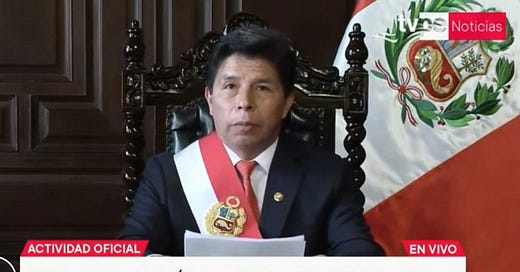Failed self-coup by Pedro Castillo
Castillo attempted to dissolve Congress and become a dictator in Peru
By Luis Fierro Carrión (*)
Twitter: @Luis_Fierro_C
On Wednesday, December 7, at 11:48 in the morning, the President of Peru, Pedro Castillo, shakily read a speech in which he called to "dissolve the Congress of the Republic", "establish an emergency government" and "convene in the shortest term elections for a new Congress with constituent powers."
In the same message, he declared the "reorganization of the justice system, the Judiciary, the Public Ministry, the National Board of Justice and the Constitutional Court." The brief message meant that Castillo was launching a self-coup.
He emulated, in a clumsy and trembling way, the self-coup by Alberto Fujimori that took place thirty years ago, on Sunday, April 5, 1992. On that occasion, the Congress of the Republic was forcibly dissolved, and Fujimori intervened in the Judiciary, the National Council of the Magistracy, the Court of Constitutional Guarantees, the Public Ministry and the Comptroller General of the Republic. Fujimori also called elections for a Constituent Congress, which produced the Constitution that is currently in force.
The difference between one self-coup and the other is that Fujimori had the support of the Armed Forces, which occupied Congress with tanks. The Fujimori dictatorship arrested the President of the Senate, the President of the Chamber of Deputies, as well as other congressmen, journalists, mayors, political leaders and trade unionists.
In the case of Castillo, he informed the Minister of Defense and the General Commander of the Army of his intention to carry out a self-coup at 7:30 a.m., and the response was the immediate resignation of the Commander. The Armed Forces and the Police issued a joint statement in which they indicated that "any act contrary to the established constitutional order constitutes a violation of the Constitution and generates non-compliance by the Armed Forces and the National Police."
Several Ministers resigned (including the Ministers of Foreign Affairs and Economy and Finance), and the other functions of the State rejected the coup attempt. The representative of Peru to the OAS and the ambassador to the United Nations also resigned.
The Congress, which had already been summoned to hear a request for Castillo's impeachment (vacancy), ended up voting by a large majority (101 of 130 members of Congress) to remove him for "permanent moral incapacity." They also requested that Castillo be detained, which occurred 88 minutes after his coup speech.
His vice-president, Dina Boluarte (elected on the same ballot from the far-left “Peru Libre” party), was sworn in at 3:00 p.m. as the new Head of State, becoming the first woman to hold the position in Peruvian history.
Fujimori was successful because he was very close to the Armed Forces, given the fight against the terrorist group Sendero Luminoso. On the other hand, with Castillo there was a lot of distance, given the proximity of Castillo and Perú Libre to organizations related to Sendero Luminoso (including CONARE, MOVADEF and FENATE). Castillo had even appointed several Ministers accused of links to terrorism to his cabinet (Prime Minister Guido Bellido, Foreign Minister Héctor Béjar, and Labor Minister Iber Maravi).
With Dina Boluarte, Peru has its sixth President in four years (since 2018). This political instability has thus far not generated an economic or financial crisis, but if it spreads, it could have repercussions. The President has called to advance the elections to the end of 2023 (more than two years before the end of the mandate).
Following Castillo's arrest, riots have broken out in various areas of Peru, which to date have left some 18 dead. The rioters demand the resignation of Boluarte, the immediate dissolution of Congress and the convening of a constituent assembly. That is, to continue with the attempted coup. It is unlikely that they will prevail (although they have managed to press for the acceleration of the date for new elections). The government has declared a state of national emergency.
Castillo was transferred to the Barbadillo prison, where former President Fujimori is also being held (serving a 25-year sentence, in part due to his self-coup).
(*) Translated and updated version of the column published in Diario “El Universo” of Ecuador, on December 16, 2022:
https://www.eluniverso.com/opinion/columnistas/autogolpe-fallido-de-pedro-castillo-nota/




